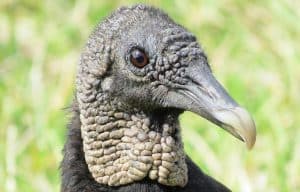Livestock facing black vulture attacks

By RHIANNON BRANCH
FarmWeek
Spring is often a time to welcome new life on a livestock operation, but black vultures are disturbing the peace by attacking newborn calves, lambs and birthing mothers.
USDA Wildlife Biologist Scott Beckerman said black vultures have increased in numbers and scope over the past 30 years and milder winters have enticed populations to remain in Illinois instead of migrating farther south.
“Black vultures have been primarily observed south of I-70 in Illinois, although we have received unconfirmed reports of them as far north as Macoupin County,” Beckerman told FarmWeek. “Some estimate that there are several thousand of the scavengers inhabiting our state during the spring, summer and fall months.”
Local farmer Gary Gilbert of Double G Simmentals told the Republic-Times in a 2021 article that he had lost young calves to black vultures.
Gilbert raises calves in Fults, Maeystown and Red Bud, and his father has a pasture close to his in Maeystown.
In 2020, his father lost about five calves to the black vultures, while Gilbert has lost an average of one calf per year.
Black vultures are smaller and have a dark grey head in comparison to red-headed turkey vultures, also native to Illinois.
Both play an important role in the ecosystem by feeding on dead animals, which contributes to disease suppression. But the predatory behavior of black vultures also pushes them to target living animals including vulnerable livestock – usually beginning with the eyes and soft tissue.
A producer’s instinct might be to get rid of the birds. But Beckerman said they are protected under the Migratory Bird Treaty Act, so their nests and eggs cannot be destroyed without a Federal Migratory Bird Depredation Permit and an Illinois Nuisance Animal Removal Permit.
The Illinois Farm Bureau has secured a federal statewide permit for 2024 and has opened applications for affected producers to obtain a free sub-permit allowing them to remove up to three black vultures to support on-the-farm livestock predation prevention efforts.
While the process to obtain the permits has been streamlined and simplified, Beckerman said there are some things producers can do right away.
“We recommend they immediately contact the USDA’s Wildlife Services program at 1-866-4USDA-WS,” he said. “Wildlife biologists will provide free technical assistance to assess the threat of livestock predation and provide recommendations for the producer to consider implementing regarding local habitat management, husbandry, and methods of dispersing vultures from the farm.”
Producers should remove attractants like open garbage, livestock carcasses and roadkill from the farm as soon as possible. Depredation can also be minimized by having livestock birth in barns or in pastures near buildings with human activity.
“Producers should also disperse vultures from pastures used for calving/lambing to prevent the birds from establishing a pattern of use in the area,” Beckerman said.
He said sound and light producing devices like starter pistols, cap guns and air dancers may be used to disperse vultures. Special attention should be focused on dispersing black vultures in the evening hours to prevent them from roosting on the farm overnight.
“In addition, a correctly positioned black vulture effigy, or dummy, can be very effective at dispersing the birds from a localized area.”
In 2023, IFB issued eight sub-permits to producers in seven counties across southern Illinois toward black vulture depredation efforts. Those interested in a 2024 permit should email tbunting@ilfb.org.
This story was distributed through a cooperative project between the Illinois Farm Bureau and Illinois Press Association. For more food and farming news, visit FarmWeekNow.com.






